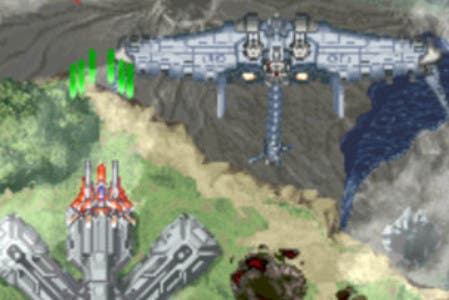App of the Day: Rayforce
It's a shame about Ray.
Once was the time when there was an air of exclusivity around the 2D shooter, typically the most expensive of genres. Witness the famously sky-high prices of the likes of Radiant Silvergun, or the lengths one had to go to in order to indulge a shooter craving in the days of the Saturn, where the cream of the crop only made its way out of Japan if you were on good terms with a local importer.
It's that Saturn heyday that Rayforce harks back to, a port of the 1993 arcade game that later made its way to SEGA's 32-bit console. And Rayforce is a fine example of a genre in its absolute pomp, all handsome sprites laced with the kind of charm that's unique to this particular era of gaming.
Rayforce's world is one of floating islands occupied by mech forces, your bright red attack ship flying over landscapes whose rough-brushed pixel-work is all perfectly visible. This doesn't boast the more refined look of latter 2D shooters such as Cave's recent mobile ports, but it's all the better for it, developer Taito offering a fine facsimile of the arcade original.

It's a more traditional shooter, then, and its lineage is as traditional as it gets. With its action taking place across two planes, the furthest reachable by a secondary shot power, it's very much a spiritual successor to Xevious, Namco's seminal 1982 title.
It builds upon that template, though - instead of dropping bombs, Rayforce allows you to paint enemies with a cursor that sits out in front of your ship, taking them down with lasers that dance gracefully across the screen. SEGA's Panzer Dragoon and Rez would later use a similar mechanic, and as in those games it adds an insistent rhythm that brings a little order to the otherwise-chaotic shooting.
As an iOS port, Rayforce is perfectly serviceable - the artwork's been delicately handled, available in the original resolution or gently upscaled, and likewise the control options allow either something that's faithful to the original or one that's more sympathetic to a touch-screen. The original arcade mode is disappointingly unwieldy, however, meaning that for an experience without undue frustration there's only really one choice.
With Taito's handling of Rayforce being so assured, an elderly classic so confidently restored, it's a shame that this iOS port also harks back to another less savoury aspect of shooters of old. At £7.99, Rayforce is eye-wateringly expensive, coming in at almost twice the price of Cave's ports of more recent arcade titles.
Back in the mid-nineties such a price would seem a snip, and indeed to the shooter aficionado it's still a reasonable price to pay. In the wider context of the App Store it may be a little hard to stomach, but for anyone keen for a window on the halcyon days of a dwindling genre, Rayforce is easy to recommend.
App of the Day highlights interesting games we're playing on the Android, iPad, iPhone and Windows Phone 7 mobile platforms, including post-release updates. If you want to see a particular app featured, drop us a line or suggest it in the comments.

